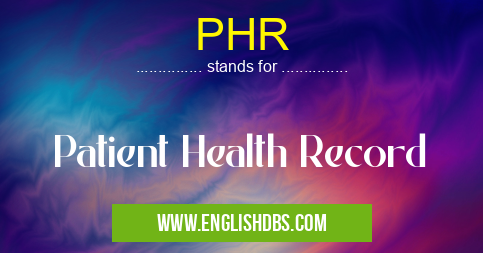What does PHR mean in HEALTHCARE
PHR stands for Patient Health Record. It is a comprehensive electronic record of a patient's health information, including medical history, medications, immunizations, allergies, and lifestyle factors. PHR differs from an Electronic Health Record (EHR), which is maintained by a healthcare provider and focuses on clinical data, while PHR is patient-centric and gives individuals control over their health information.

PHR meaning in Healthcare in Medical
PHR mostly used in an acronym Healthcare in Category Medical that means Patient Health Record
Shorthand: PHR,
Full Form: Patient Health Record
For more information of "Patient Health Record", see the section below.
» Medical » Healthcare
Meaning in MEDICAL
In the medical context, PHR refers to a standardized and secure system for managing and sharing patient health data. It allows patients to access, view, and update their medical records, share information with healthcare providers, and make informed decisions about their health.
Full Form
Patient Health Record
What does PHR Stand for?
- P - Patient
- H - Health
- R - Record
Essential Questions and Answers on Patient Health Record in "MEDICAL»HEALTHCARE"
What is a Patient Health Record (PHR)?
A PHR is a digital record of a patient's medical history, including their diagnoses, medications, allergies, and other relevant health information. It allows patients to access and manage their own health information, communicate with their healthcare providers, and make informed decisions about their care.
What are the benefits of using a PHR?
PHR offers numerous benefits, including:
- Improved access to health information
- Enhanced communication with healthcare providers
- Increased patient engagement in their own care
- Reduced healthcare costs
- Improved health outcomes
What is the difference between a PHR and an Electronic Health Record (EHR)?
A PHR is primarily owned and controlled by the patient, while an EHR is owned and controlled by healthcare providers. PHRs typically contain information that is relevant to the patient's current and future care, while EHRs contain more comprehensive information from multiple healthcare settings.
How do I create a PHR?
There are various ways to create a PHR. Many healthcare providers offer their own PHR systems, or you can choose from numerous independent PHR platforms. Once you select a platform, you can register and create a secure account.
Is my PHR information secure?
Patient privacy and data security are of paramount importance in PHRs. Most PHR platforms employ robust security measures, such as encryption, firewalls, and access controls, to protect patient information from unauthorized access or breaches.
Can I share my PHR with other healthcare providers?
Yes, you can typically share your PHR with other healthcare providers, such as your primary care physician, specialists, or pharmacists. You can grant them access to your PHR through the platform's sharing features, allowing them to view and use your health information for treatment purposes.
Final Words: PHR is an essential tool for patient empowerment, enabling individuals to take an active role in managing their health. It fosters collaboration between patients and healthcare professionals, improving communication, care coordination, and overall health outcomes. By providing patients with easy access to their health information, PHR empowers them to make informed choices and advocate for their well-being.
PHR also stands for: |
|
| All stands for PHR |
